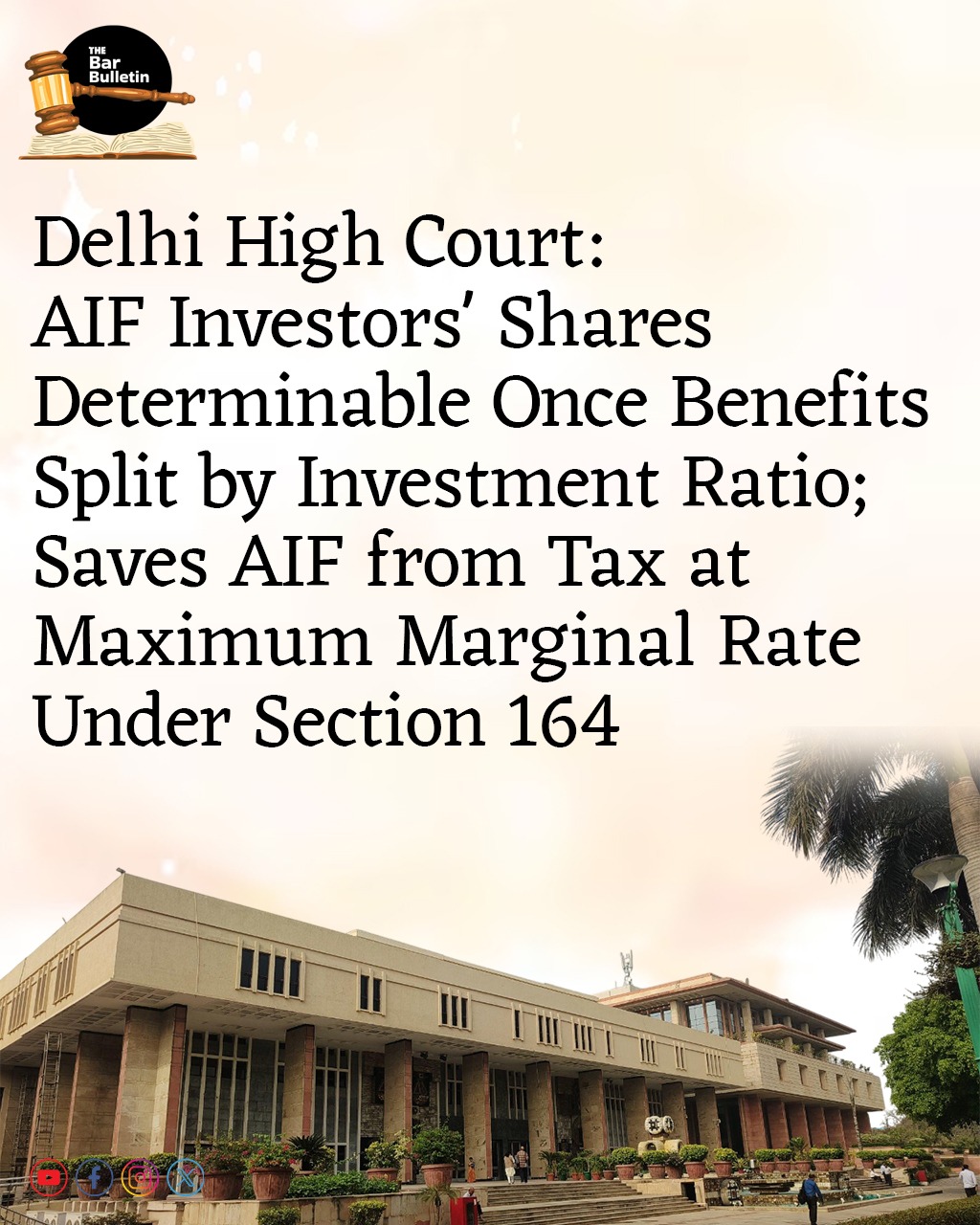While pointing out that Explanation 1 to section 164 of the Income Tax Act was in existence since April 01, 1980, placing restrictions on the Alternative Investment Fund (AIF) regarding mentioning of the names of the investors or beneficiaries in the original Trust Deed, even before CBDT Circular no.13/2014 was notified, the Delhi High Court ruled that once the benefits are to be shared in the proportion to the investments made, any person with reasonable prudence would reach to the conclusion that the shares are determinable, and once the shares were determinable, it would meet the requirement of law to come out of the applicability of section 164 of the Income Tax Act.
The ruling came in pursuance of the fact the CBDT Circular no.13/2014 which clarified that Category III AIF would be taxable at the Maximum Marginal Rate at the hands of the “Representative Assessee” under the provisions of Explanation 1 to Section 164 of the Income Tax Act, if the original Trust Deed did not mention the name of the investors or the beneficial interest of the investors, is in contravention to the Regulations 3(1), 4(c) & 6(3) of the SEBI Regulations read with Section 12 of the SEBI Act, which prohibits from mentioning the names of the investors or beneficiaries in the original Trust Deed unless they are registered.
The Division Bench comprising Chief Justice Devender Kumar Upadhyay and Justice Tushar Rao Gedela questioned as to how and in what manner a Category III AIF entity like the petitioner would specify or mention the names of the investors or beneficiaries in the original Trust Deed at the time of registration, when the SEBI has mandated that no AIF can accept any commitment or investment from any investor or beneficiary unless and until it is first registered in terms of Regulation 4(c) of the SEBI Regulations under the provisions of Registration Act, 1908 and thereafter be granted certificate of registration under Regulation 6 of the SEBI Regulations.
In this case, the petitioner, engaged in rendering Portfolio Management Services, is incorporated to act as an Alternative Investment Fund Category III in terms of SEBI (Alternative Investment Funds) Regulations, 2012. During the relevant period, the SEBI notified the classification of the AIF in three categories, as per which the petitioner argued that to float an AIF, Category III fund, Equity Intelligence floated the AIF services for the petitioner and acted as the settlor of the petitioner. Later, the petitioner launched a single open-ended scheme, namely, EQ India Fund, registered with SEBI for investment in listed equity shares. Pursuant to its launch, contribution agreements were executed with various investors, and units of Rs. 1000 each were issued, and as a long-term investment, an exit load of 5% of the Net Asset Value is levied for redemptions within two years. The petitioner claimed that the identity of investors and their income share is determined following the contribution agreements executed post the Trust Deed.
Now, it was the case of the petitioner that since the fund is treated as a separate taxable entity, the EQ India Fund filed its separate returns of income since its very inception, and to seek clarity on the taxability, the petitioner filed an application in Form 34DA and section 245Q(1) of the Income Tax Act, seeking advance ruling. However, in the meantime, the AO completed the assessment in the case of EQ India Fund, accepting the returned loss of the Trust. Later, since the Finance Act, 2021 abolished the institution of AAR and replaced the same with the Board of Advance Rulings (BAR), the BAR rejected the application for withdrawal filed by the petitioner by holding that that if the names of the beneficiaries are not set out in the original Trust Deed then such Trust would be treated as indeterminate and resultantly be subject to Maximum Marginal Rate under the provisions of section 164 of the Income Tax Act.
When the matter came to the High Court, the CBDT Circular No.281/1980 dated Sep 22, 1980, and the Explanation appended to amended Section 164 inserted by the Finance (No. 2) Act, 1980, were referred to observe that the new provisions would apply in respect of all discretionary Trusts whether created before or on or after April 01, 1980. The Court also referred to the submissions of the Petitioner that on one hand, the CBDT Circular no.13/2014 mandated Trusts akin to the petitioner Trust i.e. Category III AIFs, to necessarily mention the name of the beneficiaries on the original Trust Deed whereas on the other hand, the SEBI Regulations prohibited any investment to be obtained from the beneficiaries before obtaining certificate of registration from it, claiming this procedure to be contrary to the doctrine of impossibility.
Further, referring to the provisions of Regulation 3(1) & 6(3) of the SEBI Regulations read with Section 12 of the SEBI Act, the Court observed that unless and until a Trust registers the original Trust Deed, firstly under the provisions of Registration Act, 1908 and secondly, obtains the certificate of registration under the provisions of SEBI Act and Regulations, it cannot accept any funds or investment from a beneficiary. Therefore, emphasizing that the SEBI Regulations are in contravention of the CBDT Circular, and highlighting that the order passed by the Respondent/ BAR has overlooked the settled principles, the High Court quashed the same and allowed the petition in favour of the taxpayer.
Cases Relied On:
Commissioner of Income Tax vs. M/s India Advantage Fund-VII,2017 SCC OnLine Kar 6857
Commissioner of Income Tax, Chennai vs. TVS Shriram Growth Fund, 2020 SCC OnLine Mad 28112
Appearances:
Senior Advocates S. Ganesh and Kavita Jha, a/w Advocates Vaibhav and Himanshu Aggarwal, for the Petitioner
Advocates Puneet Rai, Ashvini Kumar, and Rishabh Nangia, for the Respondents

